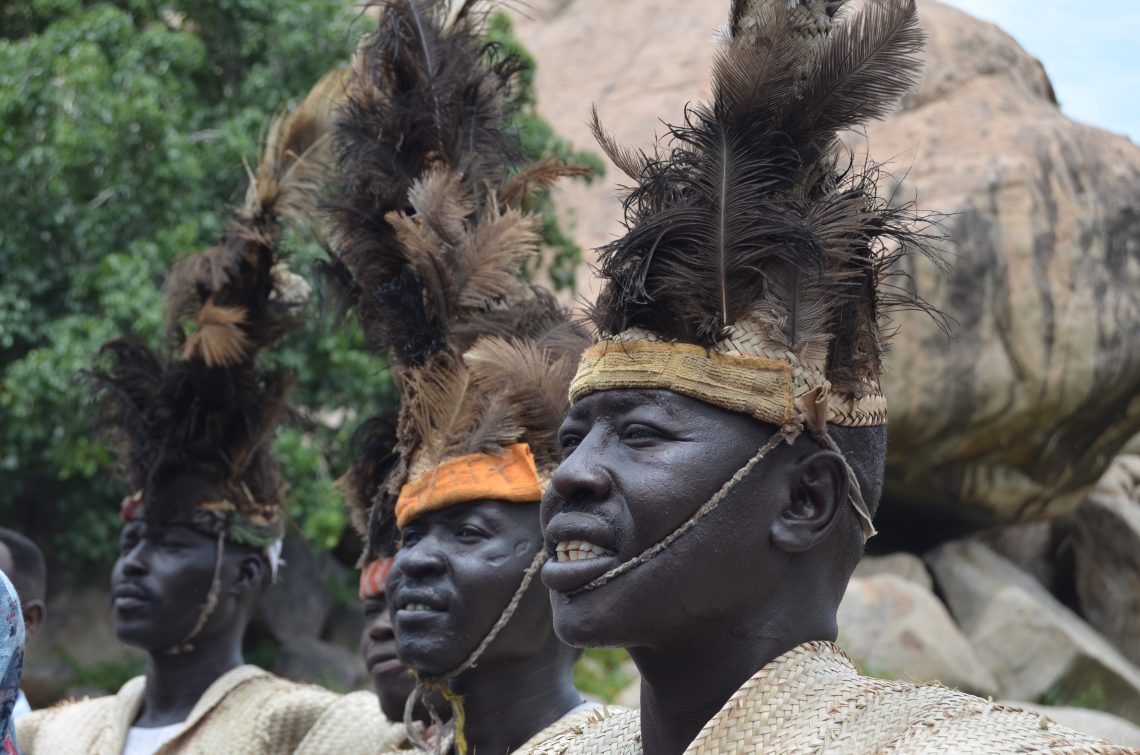
Agadi: Abdul Wahhab Juma’a
In the middle of a massive hill, Faris Yousef dances with his companions, “The Ecstasy of the Harvest”, which reminds the people of the grace of rain and the abundant yields of Dura which hopefully will protect the people of the region from destitution.
The young man ,who is in his twentieth , dances among the “rababa” players and a blower of a trumpet. The warriors on their traditional costumes presenting the prototype of the sublimed qualities of the brave men of the Ingesana when they confront dangers.
Performing the harvest dance, Faris Youssef says that the chant is a reminder of the blessing of rain and the abundance of the harvest of dura.
He comments that the chant is a heritage of the people of the Ingesana ,adding”It heightens the enthusiasm of the people for an abundant harvest.”
Faris performed the chant since he was young . About this he says: “In this way I preserve the heritage of the ancestors.” He refers to heritage of the ancestors when they call the local tenants by blowing the “horn” to assemble for harvest or in the case of “panic” to alert everyone to get ready to confront an imminent danger.
The people of Ingesana are considered one of indigenous peoples in Sudan who still preserve their traditional ways of life although their life have been subjected to imposed changes throughout the years of the rule of the so called salvation era.. They live in the Ingesana mountains range in the Blue Nile province .Now a state.
In the middle of a mountain called “Agadi”, which is one of the four mountains surrounding the Agadi region south the city of Damazin, the capital of the Blue Nile State, sat a player of a local music instrument called “Rababa” while warriors on their traditional costumes surrounded him dancing and sang “The Harvest Song”.
Participants in the chant decorated themselves by wrapping around their heads ostrich feathers and other birds’ feathers which were swayed with their elongated lengths by the blowing wind and the wobbling heads enchanted by the enthusiastic tunes of the dancing mob.
The performers wear waist robes made of thin strips of “fronds” taken from dom- palm trees that grow in the valleys and mountains of the Inqeasna. Everyone rotated in a large ring from west to east while the “rababah” player sat on a smooth- surfaced rock in the middle of the ring.
Every time a horn blower blew roaring sounds which heightened the people’s enthusiasm, and when the “rababah” player reached the ultimatum of the song, the rotating ring of the dancers shrinked all of a sudden stopping their movement with a knock on the ground timed with the last note of the song.
The mayor of “Agadi” region, Mustafa Dawas, says that the celebration of the harvest in the mountains of Agadi region acquiree the special spirit of the people of the Ingesana tribe . He states that the Agadi region has a great symbolism for the people of the Ingesana. Explaining “It is a region where people come to ask for an opinion or an advice… and where the wounded are treated by the tribal medics”. He refers to the stories of the brave warriors who used to face fierce beasts in the past.
He said that lions and carnivorous predators used to roam the plains and mountains of the Ingesana in the old days.
He recalls the brave deeds of the majestic warriors of the Ingesana who were chosen to confront lions in mountainous paths to attract them to prepared ambushes. He adds “The warrior grabs the lion’s jaw or arm while the other hunters stab their blades in its body.”
He said that the “horn” is blown usually to warn people of lions and wild animals and when Trumpet is blown that means a great danger is imminent.”
With the smile of a man who experienced life, he says, “The horn is the counterpart of the mobile phones currently alerting people to risks or calling them to an invitation”.
Faris Youssef descended from “Agadi” mountain to the foothills. There he was still inspired by the rocks of the mountain and the will of the ancestors’ souls, but there too, at the foothill, he would face life variables that might wreak the spirit of the last warriors of Ingesana.















